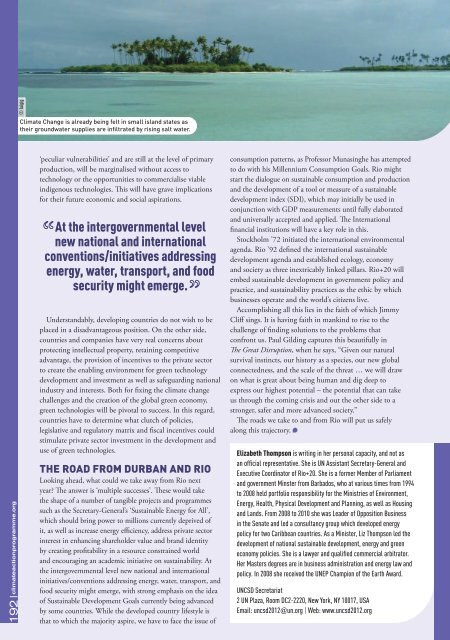Climate Action 2011-2012
You also want an ePaper? Increase the reach of your titles
YUMPU automatically turns print PDFs into web optimized ePapers that Google loves.
© luigig<br />
<strong>Climate</strong> Change is already being felt in small island states as<br />
their groundwater supplies are infiltrated by rising salt water.<br />
192 climateactionprogramme.org<br />
‘peculiar vulnerabilities’ and are still at the level of primary<br />
production, will be marginalised without access to<br />
technology or the opportunities to commercialise viable<br />
indigenous technologies. This will have grave implications<br />
for their future economic and social aspirations.<br />
At the intergovernmental level<br />
new national and international<br />
conventions/initiatives addressing<br />
energy, water, transport, and food<br />
security might emerge.<br />
Understandably, developing countries do not wish to be<br />
placed in a disadvantageous position. On the other side,<br />
countries and companies have very real concerns about<br />
protecting intellectual property, retaining competitive<br />
advantage, the provision of incentives to the private sector<br />
to create the enabling environment for green technology<br />
development and investment as well as safeguarding national<br />
industry and interests. Both for fixing the climate change<br />
challenges and the creation of the global green economy,<br />
green technologies will be pivotal to success. In this regard,<br />
countries have to determine what clutch of policies,<br />
legislative and regulatory matrix and fiscal incentives could<br />
stimulate private sector investment in the development and<br />
use of green technologies.<br />
The roaD from Durban anD rio<br />
Looking ahead, what could we take away from Rio next<br />
year? The answer is ‘multiple successes’. These would take<br />
the shape of a number of tangible projects and programmes<br />
such as the Secretary-General’s ‘Sustainable Energy for All’,<br />
which should bring power to millions currently deprived of<br />
it, as well as increase energy efficiency, address private sector<br />
interest in enhancing shareholder value and brand identity<br />
by creating profitability in a resource constrained world<br />
and encouraging an academic initiative on sustainability. At<br />
the intergovernmental level new national and international<br />
initiatives/conventions addressing energy, water, transport, and<br />
food security might emerge, with strong emphasis on the idea<br />
of Sustainable Development Goals currently being advanced<br />
by some countries. While the developed country lifestyle is<br />
that to which the majority aspire, we have to face the issue of<br />
consumption patterns, as Professor Munasinghe has attempted<br />
to do with his Millennium Consumption Goals. Rio might<br />
start the dialogue on sustainable consumption and production<br />
and the development of a tool or measure of a sustainable<br />
development index (SDI), which may initially be used in<br />
conjunction with GDP measurements until fully elaborated<br />
and universally accepted and applied. The International<br />
financial institutions will have a key role in this.<br />
Stockholm ’72 initiated the international environmental<br />
agenda. Rio ’92 defined the international sustainable<br />
development agenda and established ecology, economy<br />
and society as three inextricably linked pillars. Rio+20 will<br />
embed sustainable development in government policy and<br />
practice, and sustainability practices as the ethic by which<br />
businesses operate and the world’s citizens live.<br />
Accomplishing all this lies in the faith of which Jimmy<br />
Cliff sings. It is having faith in mankind to rise to the<br />
challenge of finding solutions to the problems that<br />
confront us. Paul Gilding captures this beautifully in<br />
The Great Disruption, when he says, “Given our natural<br />
survival instincts, our history as a species, our new global<br />
connectedness, and the scale of the threat … we will draw<br />
on what is great about being human and dig deep to<br />
express our highest potential – the potential that can take<br />
us through the coming crisis and out the other side to a<br />
stronger, safer and more advanced society.”<br />
The roads we take to and from Rio will put us safely<br />
along this trajectory.<br />
Elizabeth Thompson is writing in her personal capacity, and not as<br />
an official representative. She is UN Assistant Secretary-General and<br />
Executive Coordinator of Rio+20. She is a former Member of Parliament<br />
and government Minster from Barbados, who at various times from 1994<br />
to 2008 held portfolio responsibility for the Ministries of Environment,<br />
Energy, Health, Physical Development and Planning, as well as Housing<br />
and Lands. From 2008 to 2010 she was Leader of Opposition Business<br />
in the Senate and led a consultancy group which developed energy<br />
policy for two Caribbean countries. As a Minister, Liz Thompson led the<br />
development of national sustainable development, energy and green<br />
economy policies. She is a lawyer and qualified commercial arbitrator.<br />
Her Masters degrees are in business administration and energy law and<br />
policy. In 2008 she received the UNEP Champion of the Earth Award.<br />
UNCSD Secretariat<br />
2 UN Plaza, Room DC2-2220, New York, NY 10017, USA<br />
Email: uncsd<strong>2012</strong>@un.org | Web: www.uncsd<strong>2012</strong>.org












